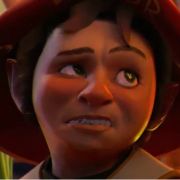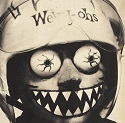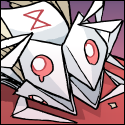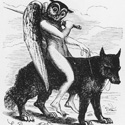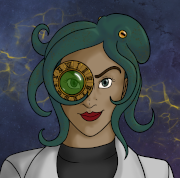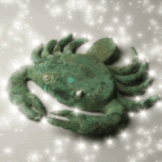|
How do you guys introduce new concepts, lingo etc. into a story without overwhelming the reader, especially if they're common, everyday things in your world? One of the things I plan to write includes stuff like 'arcaneers'- basically, magician-engineers who design and maintain the magitech the universe runs on. I'm just not sure on how to introduce them easily.
|
|
|
|

|
| # ? May 13, 2024 22:49 |
|
If you have an interesting element of your world that you have to introduce somehow, introduce them through the eyes of a character. This means that if they're completely normal to see, the first few mentions might not stick. Unless they're particularly bored, people don't stand around and talk to themselves about the intricacies of how the world works. They're going to see a little bit of something, think about it a bit, and you'll be able to slowly create a picture of just what these things are. For someone that did that in-character way of introducing a quirk of their world, I'd suggest reading Northern Lights/The Golden Compass, which does a great job of slowly sussing out the idea of what a "daemon" is, and if I remember right, it drops the concept on the reader in the first paragraph and slowly feeds them more information as it's relevant to Lyra. This works particularly because Lyra herself is learning in more detail about daemons, so the reader can learn through her as she goes through daemon-puberty. The advantage of teaching the reader about the world through the character's interactions with the unfamiliar elements is that you're doing double work--you're conveying information about the world, while also providing characterization. (If done right, it can also keep you focused on only explaining concepts relevant to the story/characters, as there's no reason a character would be talking or thinking about something entirely irrelevant to her. Remember that worldbuilding is probably interesting to you, but your reader is only going to want to know about it insofar as it's relevant to the story you're telling. It's fine if you know more than you put in the story. That's probably the best way to do things. re: gender chat from earlier Something to keep in mind, particularly for works set in another time period, is that the cultural concepts of sexuality we have now don't extend into the past. In Roman times, sexuality was much more about dominance (you were a man if you were sticking your dick in someone) rather than gender. "I bet you went down on your girlfriend" would be a huge insult to a Roman, because in their minds, you'd be saying that they made themselves submissive to a woman. Point is, sexuality can change a lot just through the passage of time.
|
|
|
|
Stanislaw bellowed as he gave a start, "Cursèd arcaneers!" Mel reeled, "Arcaneer? What the............?!" Stanislaw grinned, "As you know, Mel, our world runs on Magitech, so--" "Of course, every Knabe in Elopandia knows about Magitech!" Lem retorted. "Yes, so do you think that the Magitech runs itself?" "I never really thought about it............................" "Recall: Sanderson's first law of magic states that all magic systems must be convoluted and in your face, so do you really think Magitech could run itself???" Stanislaw chortled. "No, well--" "They are magician-engineers who design and maintain the Magitech the universe runs on. I'm just not sure on how to introduce them more easily than that, Lenard!"
|
|
|
|
drat, do you work for Black Library, systran? I swear that's word-for-word how the Enginseers are introduced in some book or another. (Introduce your Arcaneers by having some piece of magitech break down so you can talk about it. That seems like a good in.)
|
|
|
|
Don't introduce your people that I've forgotten the word for now, just have them do stuff and it will be apparent eventually.
|
|
|
|
General Battuta posted:All stories contain ideology - you might as well examine and make it intentional, so it can serve the themes and emotion of your work. Can you expand on this a bit? I feel like I disagree but I'm not sure because it's hard to know exactly what you're trying to say.
|
|
|
|
CommissarMega posted:How do you guys introduce new concepts, lingo etc. into a story without overwhelming the reader, especially if they're common, everyday things in your world? One of the things I plan to write includes stuff like 'arcaneers'- basically, magician-engineers who design and maintain the magitech the universe runs on. I'm just not sure on how to introduce them easily. I try and make it clear from the context what the thing does when possible. Try and avoid "As you know", that only sounds right when someone is giving a briefing to a bunch of people. You are probably going to need a "cabbagehead" character unfamiliar with stuff that needs in-depth explaining, though. quote:The glowing lightsphere illuminated the progress of Max Winstone’s fountain pen across his history paper. A large blob of ink leaked out, ruining several words. Max mopped it up with his handkerchief. The peach-sized sphere flickered twice, then dimmed slightly - the fifteen-minute warning. He had forgotten to recharge it with the sundrinker this morning. You've never seen either a lightsphere or sundrinker, but you can probably guess what they're for. Axel Serenity posted:In film, a logline a one-sentence overview of the entire story, and he goes into detail about how to really craft a great one. If you have a weak logline, then your story may be weak! If your logline has juxtoposition, a setting, and conflict all packaged nicely, you may have a good story! Plus, since it's one sentence, you can ask random people at Starbucks, work, wherever and get immediate feedback. My logline problem is one of my own making: An archaeologist-turned-con-man is hunted by agents of two warring governments seeking his father’s secret files. A trainee spy learns that a complete stranger has been having dreams of her imminent death for ten years. An accident with an ancient artifact from a dead civilization creates a painful link between the minds of two people, who must search for a way to undo it. They're all describing the same story. The obvious answer might be to split them up into different stories, but to me they seem intertwined. Oh well, I'll probably have to put this idea into a box and set it on fire.
|
|
|
|
Martello posted:Can you expand on this a bit? I feel like I disagree but I'm not sure because it's hard to know exactly what you're trying to say. I don't wanna put words in his mouth, but I interpret what he's saying as that no matter what you do, what you write contains a lot of information about your opinions/beliefs. In my own opinion, although some may disagree, everything you write is drawn from within - even if you are consciously trying to base a character off say, a real-life historical figure or a friend. What you're really doing is putting to paper your interpretation of that person, how you imagine they think or would act in certain situations. Even from a macro perspective, the book you write contains a lot of your own preconceptions. If you write about a utopian world, your world will be structured around what you personally perceive to be utopian, or at the very least what you expect others to perceive as utopian. Every aspect of a book can be broken down in this manner. What do you perceive as heroic? As abhorrent? As entertaining? Inevitably everything you write is submerged in your own personal philosophy, and what Battuta is saying, in my eyes, is that you might as well crystallise some of those ideas in your work by recognising them via self-analysis. For example: if you are a strong believer in individualism or the power of ~luurve~ or something, you might as well make that explicit and take extra care in making sure that message transmits well. Coincidentally, I disagree with this approach but I know I am in the minority when I do. I much prefer the more natural, unconscious exposition of ideology through character, plot and setting. As a reader I consider myself pretty attuned to when an author is 'making a point' within a story and I really loving hate it. Nothing turns me off more than seeing an agenda behind a piece of fiction.
|
|
|
|
I pretty much agree with your post except that I'm not sure how to connect your last paragraph with the rest. Explicating ideology through character, plot, and setting is exactly what I'm talking about. When you decide that this society's devotion to academic transparency gives it a technological edge over that society's blinkered priesthood, you're making an ideological point. (It may be a completely accurate and empirically grounded one!) When a character realizes she's been selfish in her investments and starts spending money to help her friends move out of their miserable artist lofts so they can focus on their work, you're making an ideological point. Any time you connect a cause and an effect you are describing how you believe your fictional world operates. It might be very different from the real world (Catch-22 is full of 'unrealistic' causality, carefully designed to make a point). It might be completely subtle - say your story is a Starmaker-style cosmic history that mostly relies on physics, cosmology, and grand scale history, and the major plot points are facts like 'the proton will soon decay' and 'the universe is vast', without much room for 'the evil chicken explained that libertarianism was wrong and evil.' Everything you write will come from you and you are full of ideas and assumptions about how the world works, taught to you by experience and the experiences of the people and systems around you. So you have two choices: you are aware and in control of your story's ideology, or you are unaware of your story's ideology. Since you're a writer, and I think writers should care about intentionality in art, you might as well go for awareness. I think your concern about authors seeming to 'make a point' is a false dichotomy. Stories don't have to be didactic. You don't have to push an agenda in a piece of fiction. The point is simply that all fiction contains scraps of ideological agenda, and since this is inevitable, you might as well try to understand and examine that agenda. Again, I really want to highlight this against the inevitable flood of 'just tell a good story' posts: a good story, a great story, the simplest most direct most purely emotional story, will contain ideology. All stories describe a logic and a set of values. There's no reason not to learn to master that. Even if you want to write stories that feel agnostic to everything but their own internal momentum, you still need the skill to evaluate whether you're hitting that goal. e: This is all abstract so here's a tangible example. While doing drafts of a fantasy novel for my agent, I started thinking about the narrative treatment of a certain character, Bel. He's a subordinate to the protagonist, a social rival who's desperate to escape her authority because he fears it will ruin his career. He comes from a society where high-class men are expected to use a lot of cosmetics, so readers view him as feminized. Because the story moves pretty quickly through this passage, there's not much time to give Bel subjectivity or dwell on his side of things. Because he's not the primary antagonist, the protagonist views him more as an annoyance than a real menace. And because most of his maneuvers are social and indirect, he appears a little weaselly. All of these facts emerge from good decisions I made - keep the pace up, keep the protagonist so focused on major threats that she doesn't see smaller ones, show that soft social power is valuable and important - but together, they paint Bel as kind of a caricature: an unctuous, effeminate servitor constantly plotting to backstab. Because there aren't many other men in the story who have his gender presentation, the story now feels like it's associating his gender performance (makeup, corsets, rather like an 18th/19th century noble) with his behavior. Now that I'm aware of the connection I'm accidentally implying, I can figure out ways to defuse or complicate it. I can give Bel some moments of clearer emotion so the reader can stop and sympathize with him. Or I can write other characters with the same gender presentation but cast them more directly and positively, to show that I don't think there's an inherent link between gender performance and shifty political intrigue. The story will hopefully be more powerful and engaging for it, and if anything it'll come off as more natural, less like it's trying to make a point. Bel will read as more of a fully fleshed out human being. General Battuta fucked around with this message at 16:14 on Mar 13, 2014 |
|
|
|
Jeza posted:Coincidentally, I disagree with this approach but I know I am in the minority when I do. I much prefer the more natural, unconscious exposition of ideology through character, plot and setting. As a reader I consider myself pretty attuned to when an author is 'making a point' within a story and I really loving hate it. Nothing turns me off more than seeing an agenda behind a piece of fiction. Well then we're both in the minority. And that's why I wanted more clarity on Battuta's point. I hate it when an author disguises an idealogical tract as a novel. General Battuta posted:I pretty much agree with your post except that I'm not sure how to connect your last paragraph with the rest. Explicating ideology through character, plot, and setting is exactly what I'm talking about. When you decide that this society's devotion to academic transparency gives it a technological edge over that society's blinkered priesthood, you're making an ideological point. (It may be a completely accurate and empirically grounded one!) When a character realizes she's been selfish in her investments and starts spending money to help her friends move out of their miserable artist lofts so they can focus on their work, you're making an ideological point. I just don't see it that way though. You can obviously infer ideology from any story, but I don't think it's actually always there. Sometimes a cigar is just a cigar. Sometimes a story is just a story. I write a lot of stories that focus on combat, whether it's full spectrum operations in a foreign war theater, or police drug busts outsourced to private security operators in Newark's Ironbound neighborhood. I suppose a "theme" is how soldiers or mercenaries or whoever get jaded to death and pain, even sometimes when it's one of their own friends doing the dying. This is based on my own deployment experience. But that's not the point of the story. The point is to tell an entertaining, action-oriented sci fi story about urban mercenaries in the NY Metroplex. Yeah, some "ideology" might come through, and I know when it does, but that's not the focus of the story. Maybe we're on the same page here and just talking past each other. Martello fucked around with this message at 16:21 on Mar 13, 2014 |
|
|
|
sebmojo posted:
Maybe I came off a bit stronger than I intended, but there's a concentration on how writers are hacky, compared to the other authors, and the rarified life of the writer. And the bits about how writing today is valued because finding info is easier than it used to be and internet access makes your fiction worthless was especially notable for an article that overall lacked that type of negativity.
|
|
|
|
Martello posted:Well then we're both in the minority. And that's why I wanted more clarity on Battuta's point. I hate it when an author disguises an idealogical tract as a novel. Again, as I explained above, this is not about how to pack as much political preaching into a story as you can. This is about making a better story, because all stories will contain politics, and you want those politics to work for the story and characters, not against or orthogonally to them.
|
|
|
|
I think we are all mostly in agreement. My concern was that simple self-awareness of what your work displays shouldn't necessitate that you ruminate and adjust stuff in order to appease some pre-decided agenda, or some imagined audience. I think there is a real difference between adjusting how a character appears, such as Bel in your story, to match more closely how you feel they should be - completely internal to your world and your story, and adjusting them to go over better with some imagined reader. It isn't hard to find examples where you can feel an author has shied away from certain things because they are concerned with how it might be interpreted rather than be purely focused on how it works within the story itself.
|
|
|
|
General Battuta posted:Again, as I explained above, this is not about how to pack as much political preaching into a story as you can. This is about making a better story, because all stories will contain politics, and you want those politics to work for the story and characters, not against or orthogonally to them. I edited my post - I hit "post" without seeing your reply. I think Jeza and I might be interpreting your ideology thing differently from how you mean. Using your Bel example, I think you're talking about being mindful of the point a story might be making to the reader, whether you want it to or not. As I said before, a reader can infer anything he wants into a story. And as some of us know, they certainly will. I was an English major in college, and there are some over-reading motherfuckers out there in the acadmeic world. Every word you use will mean something to these clowns. I guess I'm reacting to that kind of thinking when I say I don't want to worry about ideology in my story. Going back to your Bel example, I'll give you another one from the NY Metro street mercenaries story I was talking about. After a couple years of editing this story, I suddenly realized I had a problem. The protagonist, Bronco, is white (half-Sicilian, but that's another can of worms altogether), and so is his girlfriend, cousin, and the fellow merc who takes him on a job in the second half of the story. The first person the protag kills is dark-skinned, ethnicity uncertain. In the second half, he and the other merc raid a drug house in Ironbound and kill everyone in it. The only gang member described is clearly black. I took a step back and thought to myself, this looks pretty racist. Yeah, the other mercenary is a lesbian woman, and Bronco's fixer/employer is Filipina. But if you tally his kills, all three of them are black men. It all made sense for the neighborhoods, but nobody made me pick North Philly and Ironbound. So I went back and changed some things around. I added another scene where Bronco is involved in a bar fight and the bouncer who backs him up is black. The North Philly drug dealer he kills is now "not quite what the media likes to call white" but neither is Bronco if you watch The Sopranos. I went into more detail about the Filipino neighborhood he lives in (Little Manila in Queens), and how the local neighborhood watch protects him and everyone else from dangerous drug gangs in surrounding neighborhoods. Now that I'm extending what became a long short story (7900) into a novel or novella, I'll add even more ethnically diverse characters to the cast. And not all of them will be on the wrong end of Bronco's gun. But the point isn't "oh man I don't want to offend the LIBERALS reading my stories," it's "well, we live in a melting pot world and it seems that in 2062 that pot will be even more diverse, I want to represent that in my story WHILE ALSO reducing a racist interpretation of my character choice." So again, we might actually agree on this. I think it's just a matter of word choice and presentation. Martello fucked around with this message at 16:35 on Mar 13, 2014 |
|
|
|
I think everything a writer does should consider the effect on the reader. Another easy example to point to is Asimov. He wanted to write a big sweeping story, a future history about the fate of empire. He called it Foundation. It was heady, intellectual, unconventional in its tensions - and mostly absent of women. So Asimov, probably by accident, certainly because he didn't have the tools required to cut through the ideology of the society he lived in, wrote a story that suggests that women are not important to the future of civilization. It was an error of neglect, an error of defaulting - he didn't mean to write that story. He just wasn't aware of the ideology he was writing into his world. e: Sorry Martello, just saw your post but gotta run to work - looks reasonable though!
|
|
|
|
Martello posted:I write a lot of stories that focus on combat, whether it's full spectrum operations in a foreign war theater, or police drug busts outsourced to private security operators in Newark's Ironbound neighborhood. I suppose a "theme" is how soldiers or mercenaries or whoever get jaded to death and pain, even sometimes when it's one of their own friends doing the dying. This is based on my own deployment experience. But that's not the point of the story. The point is to tell an entertaining, action-oriented sci fi story about urban mercenaries in the NY Metroplex. Yeah, some "ideology" might come through, and I know when it does, but that's not the focus of the story. Except I don't see how that's devoid of ideology. Actually, it sounds to me like it's full of ideology, intentional or no-- ideology about criminality, about warfare, about who and when and how to kill. I'm not saying the story needs to be a political screed or anything, but even if you're just setting out to write a fun action story there's going to be some moral judgment in there about when and why the use of force is justified. Even if you're populating your world with faceless, generically evil ninjas who have absolutely no purpose beyond being evil, you're still fronting an ideology-- namely "same people are evil and you have to kill them before they kill you." That only becomes more true when you start adding actual depth to the conflict (in the sense that you're fronting an ideology, not that you're fronting that specific ideology). Opposing Farce fucked around with this message at 19:13 on Mar 13, 2014 |
|
|
|
CommissarMega posted:How do you guys introduce new concepts, lingo etc. into a story without overwhelming the reader, especially if they're common, everyday things in your world? One of the things I plan to write includes stuff like 'arcaneers'- basically, magician-engineers who design and maintain the magitech the universe runs on. I'm just not sure on how to introduce them easily. If you remember one thing, remember this: if you use a thing every day you do not think about how it works. Every time you use a door you don't think about hinges or what makes that door open the direction it did. You can use this a lot to your advantage, too-- it's very easy to convey that something is ordinary simply by how people in contact with it don't find anything remarkable to say about it. I've got more I could say on the subject but that's the most important part, I think, and I've got to scoot.
|
|
|
|
Along the same vein, I think Stephenie Meyer would have gotten way fewer articles written about the damaging messages in her Twilight series if she'd examined her choices, then considered the implications and ideology she was conveying. I'm sure her point was to write a coming-of-age romance with sexy vampires, and ideology wasn't the focus or the intention. And yet, whether it was her intention or not, she presented a vampire romance that also contained some very toxic relationships, and a heroine who's ready to kill herself the moment her boyfriend leaves her, which he does "for her own good." And this is painted as an idealized love. This could have been avoided had she been more self-aware about her writing. You don't have to be Ayn Rand, but you don't need to be Stephenie Meyer either. vvv I was too optimistic. 
Crisco Kid fucked around with this message at 19:11 on Mar 13, 2014 |
|
|
|
Crisco Kid posted:Along the same vein, I think Stephenie Meyer would have gotten way fewer articles written about the damaging messages in her Twilight series if she'd examined her choices, then considered the implications and ideology she was conveying. One of the main problems with Stephanie Meyer was that she really was self aware of what she was promoting and DID think it was the perfect relationship. Wanting to die because your one true love has left you? Perfect. All the female characters being miserable about immortality because they can't have babies? Perfect. Male love character who controls the girl of the relationship, watches her constantly and tells her what she can do and is acknowledged to know best? Perfect. The main problem with the Twilight - and it's important effects on the population of young women who have grown up on it - is that it is presented that way on purpose and as genuine intent. To the author this was an ideal relationship. God I loving hate the Twilight books / Fifty Shades of Grey and it's toxic, abhorrent, misogynistic backwards content. On a lighter note thanks to the people who responded earlier to my question about hating every idea I ever produce. I am now worrying much less about the fact I am worrying and redirecting my spare worry into how crap stuff I write it!
|
|
|
|
CommissarMega posted:How do you guys introduce new concepts, lingo etc. into a story without overwhelming the reader, especially if they're common, everyday things in your world? In a word, don't. Truth is, the reader doesn't need to know most of the details of how or why things work. You need to know, so that you can keep everything consistent, but the reader only needs to see the effect that it has. Readers are pretty smart. Trust them to have fun figuring it out for themselves. There are things you can do to help -- try to minimize the number of new nouns you invent, for instance. "I twiddled the stud, and the tree exploded in a shower of kittens" is far more vivid than "I calibrated the Flarn to mid-woorx and a virillic beam of pure aether-shart gushed over the Manxic, which exploded in rodletts" -- even if you've already made the poor reader suffer through explanations of each of those terms. Go have a play with Fallen London at https://fallenlondon.storynexus.com, and see how much they manage to evoke, pretty much without ever explaining a damned thing. Any time you feel yourself tempted to seriously write the words "as you know", drag yourself outside and give yourself a firm slap across the chops. If everyone knows something, no-one is going to mention it. Every word on the page is from the mind of your viewpoint, either conscious (in first person) or subconscious (in third person). Try your best to make sure that what you write is stuff sane people think. No-one sane looks in a mirror and takes inventory of their appearance. They look in a mirror and think things like "My hair's a distaster." (Or "drat, I'm hot!" if they're vain.) People don't walk down the street thinking to themselves about their lithe calves shining in the sunlight. If you were writing a modern war adventure, would you feel the need to go into great detail about powder balances, combustion rates, and ballistic forces? Almost certainly not -- and if you did, it would be seriously boring to wade through those sections. Trust yourself to convey the meaning of things through context, trust the reader to have the wit to know what you're getting at, and minimize new nouns. It'll all work out OK.
|
|
|
|
Crisco Kid posted:Along the same vein, I think Stephenie Meyer would have gotten way fewer articles written about the damaging messages in her Twilight series if she'd examined her choices, then considered the implications and ideology she was conveying. Yeah I agree with this completely. It's a good idea to understand what you are communicating and to be thoughtful about your message, whatever it is. It's not possible to completely ignore all of your biases, especially if you aren't aware of them. The assumptions one makes alone will communicate something whether or not you want them to. Lethemonster, I think we might have different definitions for being aware in this case. I think, in part, being self-aware means being aware of what your writing could communicate to others, particularly those who are different from oneself. It also means being aware that your writing can communicate more than what you intend because of one's own biases/assumptions. This requires a sense of perspective and stepping out of one's box, and not assuming that everyone thinks as you do. Everyone is unique, they value things differently and all that. I don't wonder whether or not Twilight is about her idealized relationship/fetishes, but I do wonder whether she was aware of all the creepy stalker misogynistic stuff that abounds in her writing. I don't get the impression that she sees things quite like that. I feel if she was aware, she might have portrayed certain things differently and maybe the work would have been less polarizing than it ended up being. But author intent is a tricky thing. I certainly don't know enough about her as a person to say what she did or did not realize. But I feel like Twilight is a good example of what could happen if you choose to ignore the implications in your own writing, and you aren't sufficiently self critical. JuniperCake fucked around with this message at 20:33 on Mar 13, 2014 |
|
|
|
JuniperCake posted:But I feel like Twilight is a good example of what could happen if you choose to ignore the implications in your own writing, and you aren't sufficiently self critical. An example that shows you can do all that and then sell over 100 million copies of your book and have an insanely successful movie series made and never have to work again and be soooooo rich. Time to tone down your awareness and self-criticism, guys. Rake. It. In.
|
|
|
|
Opposing Farce posted:Except I don't see how that's devoid of ideology. Actually, it sounds to me like it's full of ideology, intentional or no-- ideology about criminality, about warfare, about who and when and how to kill. I'm not saying the story needs to be a political screed or anything, but even if you're just setting out to write a fun action story there's going to be some moral judgment in there about when and why the use of force is justified. Even if you're populating your world with faceless, generically evil ninjas who have absolutely no purpose beyond being evil, you're still fronting an ideology-- namely "same people are evil and you have to kill them before they kill you." That only becomes more true when you start adding actual depth to the conflict (in the sense that you're fronting an ideology, not that you're fronting that specific ideology). I didn't say it was devoid of ideology. You quoted me, and what I said was "Yeah, some "ideology" might come through, and I know when it does, but that's not the focus of the story." Meaning yes, there is ideology in my stories. But it's not the focus. I don't disagree with anything you just said, so I don't know why you're trying to disagree with me.
|
|
|
|
Martello posted:I didn't say it was devoid of ideology. You quoted me, and what I said was "Yeah, some "ideology" might come through, and I know when it does, but that's not the focus of the story." Meaning yes, there is ideology in my stories. But it's not the focus. I don't disagree with anything you just said, so I don't know why you're trying to disagree with me. Ideology is different from worldview, imo. An ideology is something you buy into and it makes for dull books because it has all the answers. A worldview is something you develop and, yes, being conscious about it is one way to write (though not obligatory). Ultimately you need to write about actual people, not people who are cardboard mouthpieces for ideas.
|
|
|
|
sebmojo posted:Ultimately you need to write about actual people, not people who are cardboard mouthpieces for ideas. Yes, this exactly.
|
|
|
|
sebmojo posted:
Correct me if I'm wrong, but I don't think anyone here is trying to make this argument. Honestly, I get the feeling that this is one of those discussions where people are mostly in agreement but are just phrasing things in different ways and debating definitions of words. Ultimately I'd say, it's good to have characters driven by their own individual personalities, specifics are better than generalizations, and it pays to think about what you put down on the page. Mileage may vary and all that jazz. I think that's most of it? Dr. Kloctopussy posted:An example that shows you can do all that and then sell over 100 million copies of your book and have an insanely successful movie series made and never have to work again and be soooooo rich. Screw it, lets all go write us some sparkling vampire erotica. Yachts for everybody!
|
|
|
|
Whenever this discussion comes up, I find the anti-ideology crowd's arguments seem to revolve around Ayn Rand's novels (consciously or not), which are bad for a variety of reasons; one of which is that it's a thinly veiled philosophical argument. When I think of ideological driven works, I think of something like David Simon's The Wire or say Raymond Chandler's works. They have specific points about the nature of institutions, government, police, the rich, etc, and how they all interact and to what effect. These author are trying to say something about the world, and ultimately influence it. (Needles to say, I'm pro-ideology.) I'm not up on post-structuralist, post-modernist, post-"Death of the Author" analysis, but I think this point is about how the author's ideology is inevitable. Who's the good guy, who's the bad guy, what is a struggle, what does it mean to win - all this is influenced by the author's ideology. But bad writing is bad writing, plain and simple. Choosing or rejecting ideology will not save from having to write well.
|
|
|
|
CommissarMega posted:How do you guys introduce new concepts, lingo etc. into a story without overwhelming the reader, especially if they're common, everyday things in your world? One of the things I plan to write includes stuff like 'arcaneers'- basically, magician-engineers who design and maintain the magitech the universe runs on. I'm just not sure on how to introduce them easily. Don't feel the need to explain. Just present them as a common thing and let the reader fill in the gaps from what they do as long as it's relevant to the plot. Carol Berg does a pretty good job of pulling the reader into the world without explaining things unless they're directly relevant, if you want an example (though one of the common complaints about my favorite series of hers - Lighthouse Duet - is that she doesn't explain things enough). However, I would also suggest against inventing a word just for the sake of being "original" when existing words would suffice. Off the top of my head, I've seen artificer used for much the same thing you described. Or arcanist. And if magitech is a common thing in the world, why wouldn't they just be considered engineers? "Arcaneer" sounds like a magic pirate.
|
|
|
|
FouRPlaY posted:Whenever this discussion comes up, I find the anti-ideology crowd's arguments seem to revolve around Ayn Rand's novels (consciously or not), which are bad for a variety of reasons; one of which is that it's a thinly veiled philosophical argument. Yes, it's just terminology; I think we're all saying much the same thing.
|
|
|
|
Dr. Kloctopussy posted:An example that shows you can do all that and then sell over 100 million copies of your book and have an insanely successful movie series made and never have to work again and be soooooo rich. I know this is sarcastic, but I think that it's worth examining how Twilight connected with a lot of people on some level, and that's totally valid. A cultural phenomenon of that scale absolutely deserves consideration and dissection. I also think you can have it all -- wish-fulfillment and deep emotional connections that still are self-aware and have a non-damaging, or even positive, messages. We don't have to compromise!
|
|
|
|
all the best writing is about communism that's why I only write about communism but also sometimes socialism when I'm feeling a little off.
|
|
|
|
crabrock posted:all the best writing is about communism that's why I only write about communism but also sometimes socialism when I'm feeling a little off. You are everything that is wrong with everything, commie.
|
|
|
|
Thanks for all the advice, guys- I definitely see some things I might have to improve. Back to the writing board, then!  Echo Cian posted:I would also suggest against inventing a word just for the sake of being "original" when existing words would suffice. Off the top of my head, I've seen artificer used for much the same thing you described. Or arcanist. And if magitech is a common thing in the world, why wouldn't they just be considered engineers? Well, it's to distinguish them from regular engineers- while common, magitech's normally used on a macro scale; FTL travel/communications, power generation from the municipal scale upwards, large ships (think intergalactic merchant ships/navy) all use magitech, while the typical civilian goes to work on combustion-engine vehicles and the like. I did think of using 'artificer', but the word brings to mind a tinker sort of character to me, and 'arcanist' sounds too magic. The mental image I wanted to evoke was a dude in a jumpsuit whacking an engine with a magic wand. Mind you, that's my opinion; for all I know, I'm in the minority here. Thoughts, goons? Echo Cian posted:"Arcaneer" sounds like a magic pirate. Stop reading my plot outlines dammit 
|
|
|
|
CommissarMega posted:Well, it's to distinguish them from regular engineers- while common, magitech's normally used on a macro scale; FTL travel/communications, power generation from the municipal scale upwards, large ships (think intergalactic merchant ships/navy) all use magitech, while the typical civilian goes to work on combustion-engine vehicles and the like. I did think of using 'artificer', but the word brings to mind a tinker sort of character to me, and 'arcanist' sounds too magic. The mental image I wanted to evoke was a dude in a jumpsuit whacking an engine with a magic wand. In real life, engineers distinguish themselves by classifying which type of engineering they do. There's mechanical engineers, structural engineers, architectural engineers, and chemical engineers, off the top of my head. Metaphyscial engineering, maybe? Magical engineering? Arcane engineering? I have to agree with the arcaneer = pirate, you've got an arrr sound and -eer at the end, that's pretty pirate.
|
|
|
|
I'd have to go with "Arcane Engineer". It sounds clear enough for a reader to make a reasonably accurate stab at what it means.
|
|
|
|
Djeser posted:In real life, engineers distinguish themselves by classifying which type of engineering they do. There's mechanical engineers, structural engineers, architectural engineers, and chemical engineers, off the top of my head. That's... an excellent point that completely slipped my mind EDIT: I do like the sound of 'arcaneer' though- maybe as a colloquialism? 'Arcane engineer' is what you'd put on a business card, but they're arcaneers at the pub?
|
|
|
|
Feels too long for a casual name. 'Arcies'/'Archy' ? Maybe lose 'Arcaneer' entirely. You'll learn that sometimes you have a cool idea that needs to be scrapped, because it just doesn't gel with the story.
|
|
|
|
Let me ask a question about exposition, but I'll do it as specifically as I can, to avoid a generalized answer that might not fit my situation. So I've been working on a story for a while now, and it's starting to get longer than I'd anticipated. I don't necessarily think this is a bad thing. My instinct is that not a lot will get cut on my first editing pass. The problem, though, is that I've now realized that there isn't a lot of action to be had here. The format of the story is like an exposition theme park; the protagonist goes from area to area for exposition dumps. I don't know how much people are going to care about reading that. But I feel like the story kind of necessitates that format, and that the exposition is the action. It's kind of a mystery plot. The main character is an investigator who ends up in a town where things are very much messed up. However, what he doesn't realize is that things are coming to a culmination around him, and by the time things boil over, he's too late. When he first arrives in town, he's talking to people who are trying to conceal what's happening. As the story goes on, he'll find people who are more free to explain what has happened in the town. Once that's been accomplished, there will be this event, which he'll be an unwitting part of. That section will be the shorter side of things, however, and both he and the reader will end the story not actually knowing exactly what had gone on. (Whether that will detract from enjoying the story or not is a separate issue.) So in a sense, the exposition isn't worldbuilding so much as it is the plot itself. Does that seem like an inherently flawed and boring structure?
|
|
|
|
Anonymous Robot posted:Let me ask a question about exposition, but I'll do it as specifically as I can, to avoid a generalized answer that might not fit my situation. It all depends on execution and your audience. Mystery I think forgives exposition more than some other genres, but it all depends on how you write it. You can say, don't do too much exposition because exposition is usually boring, but author x comes around and does it awesome and they get an audience and success. Some authors have even gotten away with writing so much exposition their books become a glorified guide about how an airport works or whatever and they still get plenty of readers and success. So I think what would be most helpful for you is to get someone to read your work, including the exposition-y bits. That way you can get some direct feedback on whether or not your writing is engaging. You could try creating a post in this forum with the first few thousand words or so and get some feedback. There are also several online communities (and offline ones for that matter) for critiquing novels piecemeal, which is another good option. But just find a way to get your work into someone's hands and then you should have your answer on whether you have too much exposition or not. JuniperCake fucked around with this message at 03:38 on Mar 14, 2014 |
|
|
|

|
| # ? May 13, 2024 22:49 |
|
JuniperCake posted:Some authors have even gotten away with writing so much exposition their books become a glorified guide about how an airport works or whatever and they still get plenty of readers and success. Hell, replace "airport" with "whaling ship" and you just described Moby Dick.
|
|
|








